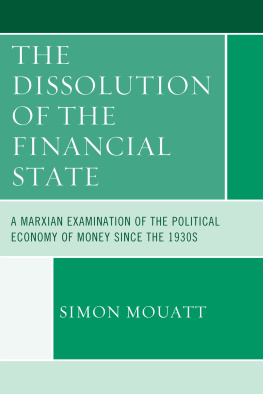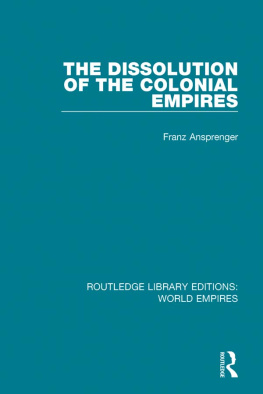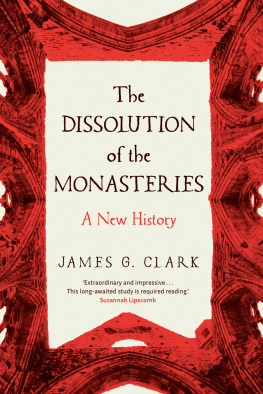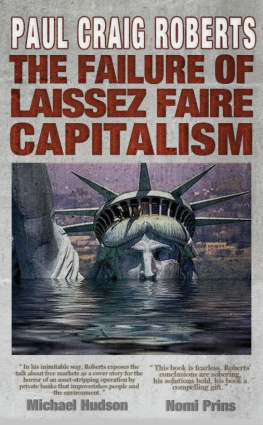Mouatt - The Dissolution of the Financial State
Here you can read online Mouatt - The Dissolution of the Financial State full text of the book (entire story) in english for free. Download pdf and epub, get meaning, cover and reviews about this ebook. publisher: Lexington Books, a division of Rowman & Littlefield Publishers, Inc., genre: Romance novel. Description of the work, (preface) as well as reviews are available. Best literature library LitArk.com created for fans of good reading and offers a wide selection of genres:
Romance novel
Science fiction
Adventure
Detective
Science
History
Home and family
Prose
Art
Politics
Computer
Non-fiction
Religion
Business
Children
Humor
Choose a favorite category and find really read worthwhile books. Enjoy immersion in the world of imagination, feel the emotions of the characters or learn something new for yourself, make an fascinating discovery.
- Book:The Dissolution of the Financial State
- Author:
- Publisher:Lexington Books, a division of Rowman & Littlefield Publishers, Inc.
- Genre:
- Rating:3 / 5
- Favourites:Add to favourites
- Your mark:
- 60
- 1
- 2
- 3
- 4
- 5
The Dissolution of the Financial State: summary, description and annotation
We offer to read an annotation, description, summary or preface (depends on what the author of the book "The Dissolution of the Financial State" wrote himself). If you haven't found the necessary information about the book — write in the comments, we will try to find it.
Mouatt: author's other books
Who wrote The Dissolution of the Financial State? Find out the surname, the name of the author of the book and a list of all author's works by series.
The Dissolution of the Financial State — read online for free the complete book (whole text) full work
Below is the text of the book, divided by pages. System saving the place of the last page read, allows you to conveniently read the book "The Dissolution of the Financial State" online for free, without having to search again every time where you left off. Put a bookmark, and you can go to the page where you finished reading at any time.
Font size:
Interval:
Bookmark:
The Dissolution of the Financial State
Heterodox Studies in the Critique of Political Economy
Series Editor : Andrew Kliman
The outbreak of the global economic crisis in 2007 has led to renewed discussion of heterodox economics and Karl Marxs contributions. Heterodox Studies in the Critique of Political Economy contributes to and seeks to broaden the focus of these discussions. It welcomes proposals from authors working within various heterodox traditions. Contributions to the critique of political economy in the tradition founded by Marx are strongly encouraged, as are other marginalized voices and perspectives. Thus, nonacademics, scholars from Asia and the global South, and proponents of perspectives that are underrepresented in the existing academic heterodox literature are encouraged to submit proposals. Both single-authored works and edited collections are welcome.
Advisory Board
Alan Freeman, London Metropolitan University
Seongjin Jeong, Gyeongsang National University
Nick Potts, Southampton Solent University
Recent Titles in this Series
Is Marxs Theory of Profit Right?: The Simultaneist-Temporalist Debate , edited by Andrew Kliman and Nick Potts
The Dissolution of the Financial State: A Marxian Examination of the Political Economy of Money since the 1930s , by Simon Mouatt
The Dissolution of the Financial State
A Marxian Examination of the Political Economy of Money Since the 1930s
Simon Mouatt
LEXINGTON BOOKS
Lanham Boulder New York London
Published by Lexington Books
An imprint of The Rowman & Littlefield Publishing Group, Inc.
4501 Forbes Boulevard, Suite 200, Lanham, Maryland 20706
www.rowman.com
Unit A, Whitacre Mews, 2634 Stannary Street, London SE11 4AB
Copyright 2015 by Lexington Books
All rights reserved . No part of this book may be reproduced in any form or by any electronic or mechanical means, including information storage and retrieval systems, without written permission from the publisher, except by a reviewer who may quote passages in a review.
British Library Cataloguing in Publication Information Available
Library of Congress Cataloging-in-Publication Data
Mouatt, Simon.
The dissolution of the financial state : a Marxian examination of the political economy of money since the 1930s / Simon Mouatt.
pages cm. (Heterodox studies in the critique of political economy)
Includes bibliographical references and index.
ISBN 978-0-7391-9037-1 (cloth : alk. paper) ISBN 978-0-7391-9038-8 (electronic) 1. MoneyHistory20th century. 2. MoneyHistory21st century. 3. CapitalismHistory20th century. 4. CapitalismHistory21st century. 5. Financial crisesHistory20th century. 6. Financial crisesHistory21st century. 7. Marxian economics. I. Title.
HG255.M68 2015
335.412dc23
2015013243
 The paper used in this publication meets the minimum requirements of American National Standard for Information SciencesPermanence of Paper for Printed Library Materials, ANSI/NISO Z39.48-1992.
The paper used in this publication meets the minimum requirements of American National Standard for Information SciencesPermanence of Paper for Printed Library Materials, ANSI/NISO Z39.48-1992.
Printed in the United States of America
Contents
This book would not have been possible without the seminal work of Professor Andrew Kliman to whom I owe a debt of gratitude. I would also like to thank Professor Victoria Chick, Dr. Carl Adams and Dr. Julian Wells for comment, and Professor Nick Potts for his insightful reflection at every stage of the research. Special thanks also to Helen Anderson for her train illustrations used in Chapter 8, Charles Caplen for proofreading, Rachel Searle for background information on the Bank of England and, for tireless support throughout the writing of this book, my wife Catherine.
| The EMT Steam Train |
| The Drive Wheel |
| The Track Meandering or Rising |
| Means of Circulation |
| National Bank Open Market Operations |
| Train Enters Tunnel |
| The Tendency for the Rate of Profit to Fall |
| German Money Supply |
| German Inflation |
| German Interest Rates |
| Deutsche Mark Dollar Exchange Rate |
| German USD Reserves as % of GDP |
| UK Total Advances |
| UK Approved Advances |
| UK USD Reserves as a % of GDP |
| UK Interest Rates |
| UK Money Supply |
| UK Inflation |
| UK USD Exchange Rate |
| UK Historic Corporate Profit Rate |
| UK Current Cost Corporate Profit Rate |
| UK Profit Rate Comparison with MELT |
| UK Profit Rate Comparison with Inflation |
| German Corporate Profit Rate |
| German Corporate Profit Rate Comparison |
| UK Profit Rate Comparison |
| US Private Debt |
| Global Foreign Exchange |
| Global Derivative Contracts |
| Value Produced and Value Received |
| The Transformation Solution |
| Physical and Value Profit Rate with Constant MELT |
| Depreciation from Wear and Tear |
| Depreciation from Wear and Tear and Obsolescence |
| Commercial Bank Balance Sheet |
| National Bank Balance Sheet |
| UK Ratio of M0 to M3 |
| UK Ratio of Narrow Money M0 to M4 |
| UK Financial and Nonfinancial Corporate Profit Rate |
| ACB | Allied Bank Commission |
| BDL | Bank deutscher Lander |
| BIS | Bank for International Settlements |
| BOE | Bank of England |
| BW | Bretton Woods |
| DB | Deutsche Bundesbank |
| ECB | European Central Bank |
| EMT | Endogenous Money Theory |
| ERM | Exchange Rate Mechanism |
| FIRE | Finance, Insurance and Real Estate Sector |
| FRG | Federal Republic of Germany |
| IMF | International Monetary Fund |
| LTFRP | Law of the Tendential Falling Rate of Profit |
| MB | Monetary Base |
| MTFS | Medium Term Financial Strategy |
| MELT | Monetary Expression of Labor Time |
| PK | Post-Keynesian |
| QTM | Quantity Theory of Money |
| STM | State Theory of Money |
| TSSI | Temporal Single System Interpretation |
| WB | World Bank |
| WW1 | World War One |
| WW2 | World War Two |
In this book I argue that the post-Keynesian (PK) theory of endogenous money (EMT) can be combined with Marxian analysis in order to give insight into the changing power relations between the state, finance sector and real economy. The control of financial resources and money, described in the book as financial power , is a primary (but not exclusive) source of social power for those that wield it. Since virtually all of modern money exists in the form of credit-money held in bank deposits and denominated in particular currencies, the political economy of the credit system and currency value are worthy of specific focus. In this respect, following the work of Susan Strange, one of the books key arguments is that financial power is derived from the control of money-issue and its purchasing power, both assumed to be determined by the state and market in varying proportions depending on context (Strange 1988). As the subtitle suggests, the theme explored in the book is the erosion of state sovereignty, in terms of this financial power, experienced from the 1930s to the current era of globalization. The assumption is that, during the Keynesian period after WW2, the state acquired a measure of capability to determine money-issue/value that has been subsequently lost. In addition, the growth of financial markets in recent decades, so-called financialization , has led many to assume that private finance is an important proximate driver of economic affairs in general. I argue in the book that the impact of the states lost capability is a democratic deficit and the reduced capacity to regulate the macroeconomy. It is common in the discourse to explain this financial transformation, and lost state sovereignty, with reference to the actual processes of financialization itself. However, this view is somewhat tautological and, therefore, provides insufficient explanation. To discuss various financial factors as causes of financial crisis, for example, risks describing the phenomena without illustrating the root causes. In contrast, the book seeks to argue that systemic drivers of capitalism (rooted in production), probably best understood by Marx, actually do provide a more plausible explanation of the causes of the financialization and erosion of state sovereignty. In addition, the post-Keynesian descriptions of monetary processes are considered to best reflect the actual reality of the monetary system. This represents an interesting synthesis of the classical Marx with modern money theory.
Next pageFont size:
Interval:
Bookmark:
Similar books «The Dissolution of the Financial State»
Look at similar books to The Dissolution of the Financial State. We have selected literature similar in name and meaning in the hope of providing readers with more options to find new, interesting, not yet read works.
Discussion, reviews of the book The Dissolution of the Financial State and just readers' own opinions. Leave your comments, write what you think about the work, its meaning or the main characters. Specify what exactly you liked and what you didn't like, and why you think so.








